NI's lockdown exit plan: Your questions answered
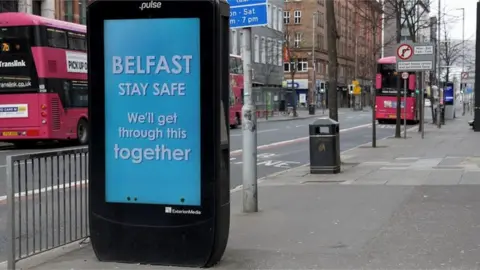 Pacemaker
PacemakerOn Tuesday, the executive published its long-awaited document for helping Northern Ireland ease out of lockdown restrictions.
It did not include indicative dates, and business groups criticised the lack of detail in the blueprint.
Ministers say they'll regularly assess the data and have promised formal reviews, but what does the plan mean for you?
BBC News NI answers some of the many questions from our audience about what happens next.
Why are there no dates or specific criteria in the plan?
Unlike England and Scotland, the Stormont Executive decided against a timetable for reopening as it said this would only lead to disappointment for people, if pledges could not be met.
The executive said it would be led by "data not dates", but the document does not include specific "trigger points" that would allow restrictions to be eased, when NI has met certain criteria.
Ministers have defended this approach, arguing that there is no overall formula that can be made public.
 Pacemaker
PacemakerHowever, we know roughly what ministers will be using to base their decisions on; the reproductive rate of the virus (R-number) remaining below one, the number of people in hospital with Covid-19 and progress in testing and tracing positive cases.
They will also consider the rollout of NI's vaccination programme and the effect of new variants of the virus, as well as taking into account continuing concerns for the economy and society.
Why is there a four-week gap between each review?
The executive says it does not want to lift too many restrictions at once, in case it leads to a sharp spike in coronavirus cases.
It points to the easing of measures before Christmas, which led to significant pressure on the health service in January and saw NI's R-number rise to 1.8.
The review cycle included in this plan - 16 March, 15 April, 13 May and 10 June - appears to be deliberately spread across four months, with ministers advised that a slower reopening will be safer.
Those are the dates when ministers legally must review the legislation.
But the plan says that they can move "more rapidly on emerging priorities should the need arise before the next review point", meaning they are not tied solely to those dates for easing some restrictions.
Equally, ministers have said it is not a given that restrictions will automatically be lifted on those review dates either.
Will all the different categories move forward at the same time? For example, will education move to step three at the same time as hospitality?
No.
The plan says it is possible "we may be in different phases across the nine pathways at any given time".
That is likely to get complicated when the first easements begin.
It is essentially a pick-and-mix approach that the executive says will give it maximum flexibility to move as and when the situation changes.
But some businesses may question the rationale for their continued closure, while others are given the green light to reopen. It's a tricky balance.
Will all school pupils return to classes after Easter?
That's not yet clear.
 PAcemaker
PAcemakerFrom Monday 8 March, children in pre-school, nursery and primary one to primary three can go back to the classroom.
Two weeks later on 22 March, those students are due to revert back to remote learning for a week so that students in Years 12 to 14 can return to school.
The intention behind that was to ensure the return of students was managed carefully, but it was criticised by some as confusing and the DUP called for the plan to be "revisited".
On Thursday, First Minister Arlene Foster said it was a "collective hope" of the executive that it can announce soon that those younger students will not have to go back to remote learning for that week.
But there is no clarity yet on when all other children can resume face-to-face learning.
Executive ministers say they hope to be able to announce a decision on the full reopening when they review the restrictions on 16 March.
Although the executive has not provided dates for most sectors, it says its key priority is getting all students back to classes as soon as possible.
When can I go on holiday again?
We can't circle any dates in our diaries just yet.
The executive's stay-at-home order still remains in place, though its recovery plan would see that measure lifted as one of the first steps out of lockdown.
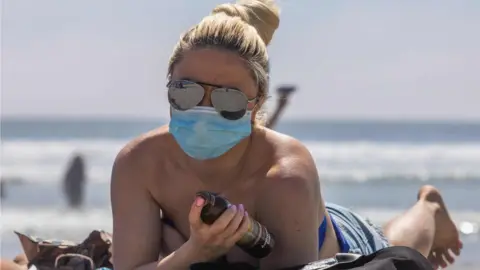 Getty Images
Getty ImagesThat does not mean that holidays can begin again right away, and there is only a vague mention of travelling for leisure in step five of the document, under "preparing for the full return" of travel.
Under Boris Johnson's plan for England, the earliest international travel might resume is 17 May - but this is subject to health data being in the right place.
Last week, Deputy First Minister Michelle O'Neill said she could not yet advise anyone in Northern Ireland to book a holiday for the summer, so clearly a lot remains to be worked out and will also be subject to executive agreement.
When will the 10-day self-isolation period for arriving in NI end?
The travel and tourism section of the executive's document does not mention quarantine rules.
At the moment, it is a requirement for anyone arriving in NI who plans to stay for more than 24 hours to self-isolate for 10 days - though there are some exemptions.
When the first lockdown ended last summer, the government introduced so-called travel corridors, which removed the self-isolation requirement for people arriving in to the UK from countries where Covid-19 transmission was deemed low risk.
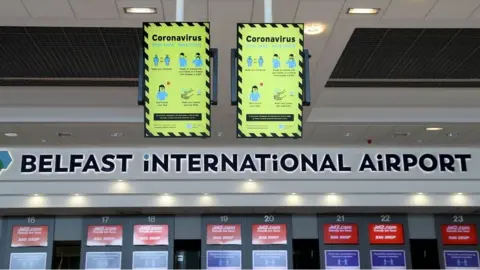 PACEMAKER
PACEMAKERAt the moment, it appears too soon to say whether this may happen again, as NI's plans for travel are not aligned with what the British government has, so far, set out for England.
International passengers arriving in NI already have to produce evidence of a negative test 72 hours before departure.
I'm shielding. At which of the five stages in the roadmap should I stop?
The plan doesn't say anything about shielding.
However, the current advice from the Stormont Executive, under the lockdown rules, is that Clinically Extremely Vulnerable (CEV) people should not attend their place of work, if they cannot work from home.
Chief Medical Officer Dr Michael McBride said it was not mandatory, but said CEV people should take caution when leaving their home during the lockdown.
That advice is in place until 1 April, and will be reviewed on 16 March when ministers meet to assess all of the restrictions.
I am pregnant. Will my husband be able to be with me for the whole birthing process?
The latest guidance on this from the Department of Health took effect on 1 March.
It comes after all four UK chief medical officers recommended that the regional alert level should move back from level five to level four, enabling visiting restrictions across all care settings to be slightly relaxed.
It states that birth partners can accompany pregnant women in the following scenarios:
- Dating and anomaly scans
- Early pregnancy clinics and Fetal Medicine Department
- When admitted to an individual room for active labour (to be determined by a midwife) and birth
- To visit antenatal and postnatal wards for up to one hour a week
When will I be allowed to play golf?
Many people are keen to get back out and take part in outdoor sport.
The executive has hinted that some outdoor sports where social distancing can be managed, such as golf and tennis, could be the first to resume once the process of lifting lockdown restrictions begins.
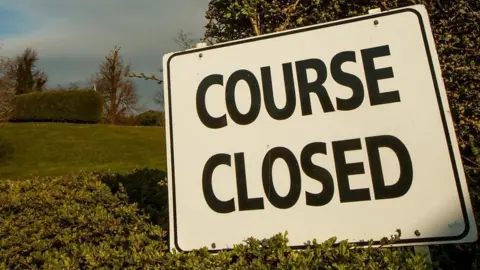 Inpho
InphoA quick scan of the recovery plan shows that under the sport section, outdoor sport can resume as part of step two.
However, there is no specific date for golf to restart yet.
How much notice will hotels and wedding venues get before they can reopen?
That is difficult to estimate.
Under the worship and ceremonies pathway in the plan, wedding receptions can't take place until step three - and only with mitigations and limited numbers.
The travel and tourism pathway also sees hotels reopening "with mitigations" under step three, but we still don't know when this will be.
That doesn't help anyone currently planning a spring wedding, but last week Deputy First Minister Michelle O'Neill promised that businesses would be given advance notice of when they can reopen, in order to allow them to bring back staff and secure stock.
What is happening with click-and-collect for non-essential retail?
From Monday 8 March, there are some slight changes to the current rules.
The lockdown introduced after Christmas saw click-and-collect banned for all but essential shops, like supermarkets.
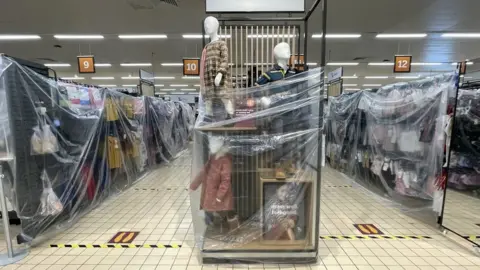 Getty Images
Getty ImagesBut last month, the executive agreed to ease the restrictions and allow shops selling clothing, footwear, baby equipment and electrical goods to restart their click-and-collect services again.
There is new guidance from the Department for the Economy about how the contactless service should work.
However, it is not clear when the executive will allow all other non-essential retail to offer click-and-collect. It appears to be in step two of the recovery blueprint.
There's no timeframe for this but the executive says one of its priorities under easing lockdown is retail, so it's possible we could see more changes here sooner, rather than later.
What about the High Street voucher scheme?
It hasn't been forgotten about, but it has been deferred.
The executive initially hoped to roll it out early this year, but the lockdown meant it couldn't happen.
The Department for the Economy is overseeing the £95m scheme and it has committed to getting it in place after non-essential retail is allowed to reopen, in order to provide short-term boosts to the economy.
It isn't clear when that will be, with non-essential shops listed under step three of the retail pathway.
Will live music events go ahead in NI this summer?
We can't say for certain.
 Getty Images
Getty ImagesIn England, it is planned that all legal limits on social contact could end no earlier than 21 June, allowing some music festivals to happen.
However, under the executive's plan for NI that excludes dates, outdoor organised events, concerts and festivals are not listed until the final step in the culture, heritage and entertainment section.
It also makes no mention of how many people might be allowed to attend such events.
Music promoter Joe Dougan, who oversees major festivals like Belsonic and the Custom House Square gigs, said he was "holding out a lot of hope" that some sort of outdoor entertainment can go ahead this summer.
